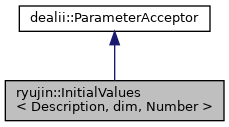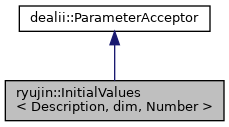 |
ryujin 2.1.1 revision 46bf70e400e423a8ffffe8300887eeb35b8dfb2c
|
 |
ryujin 2.1.1 revision 46bf70e400e423a8ffffe8300887eeb35b8dfb2c
|
#include <source/initial_values.h>


Public Member Functions | |
Interpolate initial states | |
| InitialValues (const MPIEnsemble &mpi_ensemble, const OfflineData< dim, Number > &offline_data, const HyperbolicSystem &hyperbolic_system, const ParabolicSystem ¶bolic_system, const std::string &subsection="/InitialValues") | |
| void | parse_parameters_callback () |
| DEAL_II_ALWAYS_INLINE state_type | initial_state (const dealii::Point< dim > &point, Number t) const |
| DEAL_II_ALWAYS_INLINE initial_precomputed_type | initial_precomputed (const dealii::Point< dim > &point) const |
| HyperbolicVector | interpolate_hyperbolic_vector (Number t=0) const |
| InitialPrecomputedVector | interpolate_initial_precomputed_vector () const |
Typedefs and constexpr constants | |
| using | HyperbolicSystem = typename Description::HyperbolicSystem |
| using | ParabolicSystem = typename Description::ParabolicSystem |
| using | View = typename Description::template HyperbolicSystemView< dim, Number > |
| using | state_type = typename View::state_type |
| using | initial_precomputed_type = typename View::initial_precomputed_type |
| using | HyperbolicVector = typename View::HyperbolicVector |
| using | InitialPrecomputedVector = typename View::InitialPrecomputedVector |
| static constexpr auto | problem_dimension = View::problem_dimension |
| static constexpr auto | n_initial_precomputed_values |
A class implementing a number of different initial value configurations.
Given a position point the member function InitialValues::initial_state() returns the corresponding (conserved) initial state. The function is used to interpolate initial values and enforce Dirichlet boundary conditions. For the latter, the the function signature has an additional parameter t denoting the current time to allow for time-dependent (in-flow) Dirichlet data.
For validation purposes a number of analytic solutions are implemented as well.
Definition at line 39 of file initial_values.h.
| using ryujin::InitialValues< Description, dim, Number >::HyperbolicSystem = typename Description::HyperbolicSystem |
Definition at line 46 of file initial_values.h.
| using ryujin::InitialValues< Description, dim, Number >::ParabolicSystem = typename Description::ParabolicSystem |
Definition at line 48 of file initial_values.h.
| using ryujin::InitialValues< Description, dim, Number >::View = typename Description::template HyperbolicSystemView<dim, Number> |
Definition at line 50 of file initial_values.h.
| using ryujin::InitialValues< Description, dim, Number >::state_type = typename View::state_type |
Definition at line 55 of file initial_values.h.
| using ryujin::InitialValues< Description, dim, Number >::initial_precomputed_type = typename View::initial_precomputed_type |
Definition at line 60 of file initial_values.h.
| using ryujin::InitialValues< Description, dim, Number >::HyperbolicVector = typename View::HyperbolicVector |
Definition at line 62 of file initial_values.h.
| using ryujin::InitialValues< Description, dim, Number >::InitialPrecomputedVector = typename View::InitialPrecomputedVector |
Definition at line 64 of file initial_values.h.
| ryujin::InitialValues< Description, dim, Number >::InitialValues | ( | const MPIEnsemble & | mpi_ensemble, |
| const OfflineData< dim, Number > & | offline_data, | ||
| const HyperbolicSystem & | hyperbolic_system, | ||
| const ParabolicSystem & | parabolic_system, | ||
| const std::string & | subsection = "/InitialValues< Description, dim, Number >" |
||
| ) |
Constructor.
Definition at line 20 of file initial_values.template.h.
References ryujin::InitialStateLibrary< Description, dim, Number >::populate_initial_state_list().
| void ryujin::InitialValues< Description, dim, Number >::parse_parameters_callback |
Callback for ParameterAcceptor::initialize(). After we read in configuration parameters from the parameter file we have to do some (minor) preparatory work in this class to precompute some initial state values. Do this with a callback.
Definition at line 160 of file initial_values.template.h.
|
inline |
Given a position point returns the corresponding (conserved) initial state. The function is used to interpolate initial values and enforce Dirichlet boundary conditions. For the latter, the the function signature has an additional parameter t denoting the current time to allow for time-dependent (in-flow) Dirichlet data.
Definition at line 99 of file initial_values.h.
|
inline |
Given a position point returns the corresponding (conserved) initial state. The function is used to interpolate initial values and enforce Dirichlet boundary conditions. For the latter, the the function signature has an additional parameter t denoting the current time to allow for time-dependent (in-flow) Dirichlet data.
Definition at line 113 of file initial_values.h.
| auto ryujin::InitialValues< Description, dim, Number >::interpolate_hyperbolic_vector | ( | Number | t = 0 | ) | const |
This routine computes and returns a state vector populated with initial values for a specified time t.
Definition at line 229 of file initial_values.template.h.
| auto ryujin::InitialValues< Description, dim, Number >::interpolate_initial_precomputed_vector |
This routine computes and returns a state vector populated with initial values for a specified time t.
Definition at line 263 of file initial_values.template.h.
|
staticconstexpr |
Definition at line 53 of file initial_values.h.
|
staticconstexpr |
Definition at line 57 of file initial_values.h.